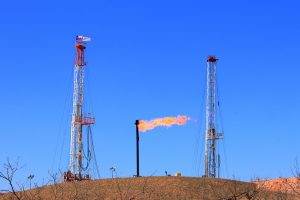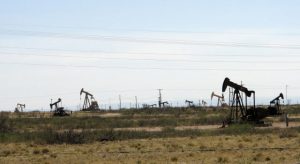
Drillers and oil and gas operators in New Mexico will be targeted in the next six months by the State Environment Department in a crackdown on compliance assurance activities.
The NMED promised in a release this week that it will “significantly increase” compliance activities in the Permian and San Juan Basins. The state plans to rely on space-based, aerial, and on-the-ground monitoring of oil and natural gas operations to determine compliance with federal and state air quality rules and operating permits.
“Despite record fines levied and collected against the oil and natural gas industry – many operators are not taking compliance with federal and state air quality rules and permits seriously,” said Environment Department Cabinet Secretary James Kenney.
He said from July 2022 to July of this year, his department agents found a “dismal 50% compliance rate” for air quality requirements. As a result, over the next several months, the department will collect data on oil and natural gas operators’ compliance. Once collected, it may even be referred to the U.S. Department of Justice and the EPA for civil enforcement.

In addition, NMED may directly enforce against oil and natural gas operators. Civil penalties collected by the U.S. Department of Justice and the U.S. Environmental Protection Agency are paid to the U.S. Treasury while civil penalties collected by NMED are reverted to the state general fund for appropriation by the New Mexico Legislature. Suspected criminal violations will be referred to New Mexico’s Environmental Crimes Task Force for further investigation and prosecution.
“Using innovative technologies to monitor oil and natural gas operations along with more conventional boots on the ground will prove effective in holding polluters accountable,” said Air Quality Bureau Compliance & Enforcement Section Chief Cindy Hollenberg. “While many oil and natural gas operators operate in compliance with state rules and permits – too many are undercutting the industry’s efforts to reduce emissions.”
While a company may elect to conduct a self-audit and disclose possible or known violations to NMED, such audits and disclosures must occur prior to the commencement of an investigation. Oil and natural gas operators that wish to take advantage of NMED’s voluntary disclosure policy must do so in accordance with our policy located here. Once NMED initiates its remote or in-person compliance assurance activities, the use of this policy is no longer available to oil and natural gas operators. An oil and natural gas operator actively engaged in a self-audit or planning a self-audit this fall should notify NMED’s Air Quality Bureau in writing as soon as possible.
“Given the poor compliance rates and rising ozone levels, there are far too few company audits and self-disclosures occurring within the oil and natural gas industry in New Mexico,” said Compliance and Enforcement Director Bruce Baizel. “An oil and natural gas company looking to audit and disclose violations must do so prior to our comprehensive investigations commencing this fall.”
The largest source of volatile organic compounds and nitrogen oxides emissions in New Mexico comes from the oil and natural gas facilities. Air quality monitors in the relevant counties in New Mexico registered rising ozone concentrations exceeding 95% of the NAAQS for ozone or 0.066 parts per million (ppm). In counties where ozone levels reach 95% of the federal standard, state law requires NMED to take action to reduce ozone pollution.
Source: NMED press release





